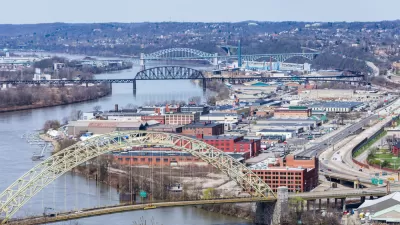The city of Toledo, Ohio provides a case study in how the best intentions of attracting degree-holding Millennials can come up short.

"Toledo continues to show signs of becoming more cool, hip, and attractive to college-educated young people," report Tom Henry and Gabby Deutch,"[b]ut statistics show the rebranding effort isn’t generating results as quickly as people want."
The article shares the results of a study of U.S. Census data commissioned by the Pew Charitable Trusts, finding that "Toledo ranked only 455th out of 521 U.S. cities for percentage growth of degree-holding Millennials between 2000 and 2014."
The article also compares the data on Millennials in Toledo to the data from other cities likes Baltimore, St. Louis, and Pittsburgh, which have all had more success in the effort. The article describes the data from Toledo as an example of the limitations of the "Rust Belt chic" model of redeveloping old buildings "with character," but "nearly 10 years after the Toledo Regional Chamber of Commerce launched a campaign to halt the so-called 'brain drain' Toledo and other Rust Belt cities were experiencing, the city is finding that retaining and attracting more college-educated Millennials require more than just a good coffeehouse," write Henry and Deutch.
The article calls on national experts, like William Frey from the Brookings Institution’s Metropolitan Policy Program, and local academics to paint a detailed portrait of the many community and economic development underway in recent years in Toledo.
FULL STORY: Toledo struggles to attract, keep young professionals

Maui's Vacation Rental Debate Turns Ugly
Verbal attacks, misinformation campaigns and fistfights plague a high-stakes debate to convert thousands of vacation rentals into long-term housing.

Planetizen Federal Action Tracker
A weekly monitor of how Trump’s orders and actions are impacting planners and planning in America.

San Francisco Suspends Traffic Calming Amidst Record Deaths
Citing “a challenging fiscal landscape,” the city will cease the program on the heels of 42 traffic deaths, including 24 pedestrians.

Defunct Pittsburgh Power Plant to Become Residential Tower
A decommissioned steam heat plant will be redeveloped into almost 100 affordable housing units.

Trump Prompts Restructuring of Transportation Research Board in “Unprecedented Overreach”
The TRB has eliminated more than half of its committees including those focused on climate, equity, and cities.

Amtrak Rolls Out New Orleans to Alabama “Mardi Gras” Train
The new service will operate morning and evening departures between Mobile and New Orleans.
Urban Design for Planners 1: Software Tools
This six-course series explores essential urban design concepts using open source software and equips planners with the tools they need to participate fully in the urban design process.
Planning for Universal Design
Learn the tools for implementing Universal Design in planning regulations.
Heyer Gruel & Associates PA
JM Goldson LLC
Custer County Colorado
City of Camden Redevelopment Agency
City of Astoria
Transportation Research & Education Center (TREC) at Portland State University
Jefferson Parish Government
Camden Redevelopment Agency
City of Claremont





























